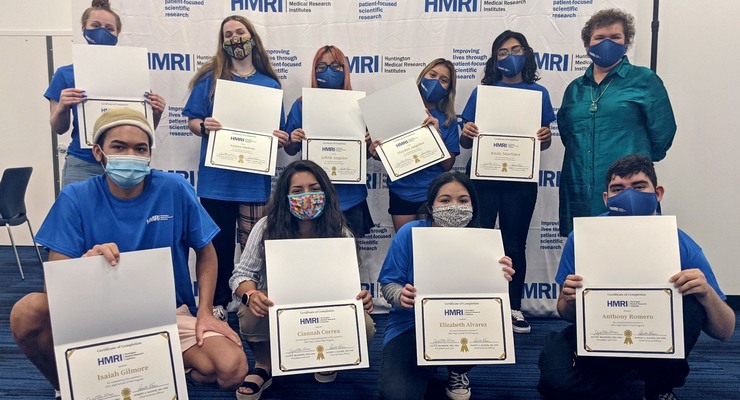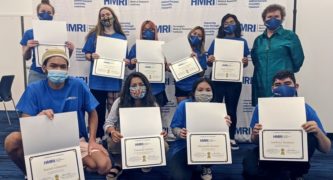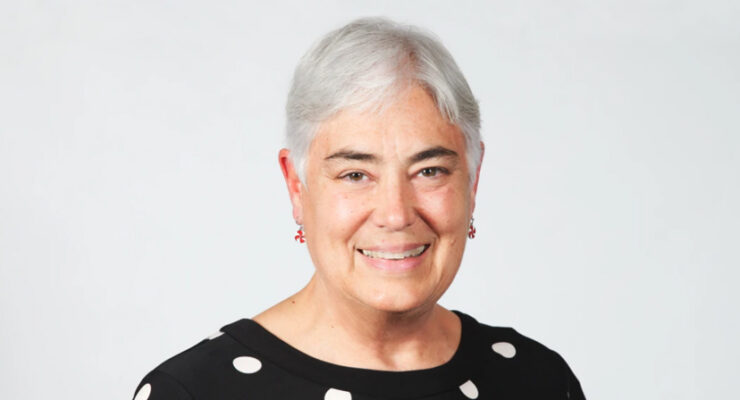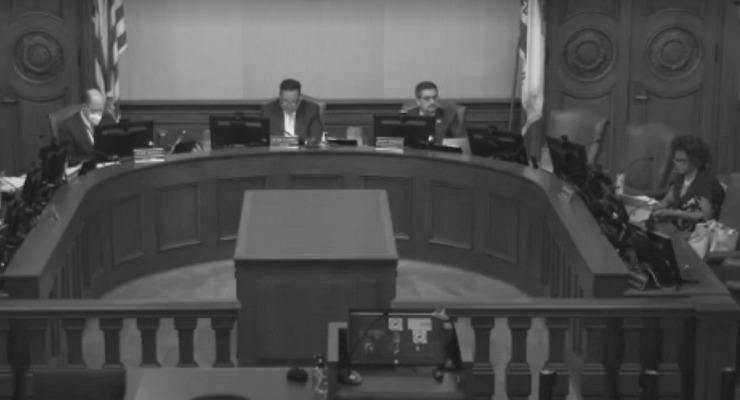
[UPDATED] Eight juniors and seniors from two Pasadena Unified School District (PUSD) schools last week completed a biomedical research high school science, technology, engineering, and mathematics (STEM) ) program initiated by Huntington Medical Research Institutes (HMRI).
The six-week program provided potentially life-changing educational opportunities, allowing students to learn from and collaborate with HMRI research scientists, a STEM instructor, and undergraduate teaching assistants.
Dr. Nicole Purcell, HMRI associate professor and director of the high school STEM program, said the inaugural program, aimed at encouraging students to follow their interests and continue to grow and develop toward science-related careers, ended July 30.
Students in the program included Skylar Adams (12th grade) and Anthony Romero (11th grade) from CIS Academy; and from Marshall Fundamental Secondary School Haydee Angeles and Emily Martinez (12th grade), and Elizabeth Alvarez, Arleth Angeles, Isaiah Gilmore and Amina Malone (11th grade).
“The students were all given kits to take home,” Purcell said. “Since we wanted to keep with COVID protocol and make sure they had a great research experience at home, all the students were given Chromebooks and they were given pipettes. They had endoscopes, digital microscopes that they could hook up to their phones or their Chromebooks. Each week, they had a theme, whether it was learning how to do research, what a research lab was made up of. They learned a lot about the anatomy of the body and about the heart, the brain, and how it works.”
Dr. Bradsher added that HMRI’s inaugural biomedical research high school STEM program was made possible by start-up funds from Pasadena residents Drs. Sonia and Neil Singla, a three-year grant from The Confidence Foundation and funding from the Ann Peppers Foundation.
“We’re delighted that this program is being so well-received by the students,” Bradsher said. “We can’t wait to see how this experience will impact the students – and long-term how, through the seeds planted here, they will impact the world for good in the future.”
Over the past 40 years, HMRI has offered a Summer Research Program to some 515 undergraduate college students, many of whom have gone on to become physicians, scientists, engineers, and researchers. Some of them now hold prestigious faculty appointments at academic institutions around the world. With this STEM program, HMRI is realizing its goal of making a greater impact by expanding summer programming to include underserved high school students, Bradsher added.
The program is geared toward students who may not otherwise have access to top-tier interactive educational programs, providing young participants with hands-on opportunities to explore solutions to some of healthcare’s biggest challenges – while having fun in the process.
“They got to use the microscopes to look at blood slides. They used fake vampire blood, but they also got to look at things in their environment, as well as tissue samples that we sent them,” Purcell continued. “We did mental health week. We had all these different activities, which they could do at home. There was only one time we had them in-person here at the Institute and that was to do brain dissection. So the week that they were learning anatomy and learning all the parts of the heart, lungs and brain, they actually got to come here to campus on the Institute and dissect sheep brain.”
Program instructor Jacqueline Fonseca said classes were conducted live on a virtual platform from 9 a.m. to 1 p.m. Monday through Friday over six weeks.
“While we prefer meeting in person whenever possible, there are amazing virtual lab activities available now because of the need to be socially distant,” Fonseca said. “With so many different lab types available, students get experiences they might not otherwise be able to have in a lab setting.”
Each week was dedicated to a particular subject matter, among them research methods and instrumentation; brain, heart and lung anatomy; pathology and imaging; genetics and mental health.
The program culminated with research projects that the students presented via Zoom in a symposium event last Friday.
“Our board members and friends and family could come in and see them present, but we kept it socially distanced,” Purcell said. “We had just one or two people in the room if they brought a family member with them so they got to present and everyone else watched on their phones or was out watching it on a screen. We had our ending and we gave them the Certificate of Achievement and they got to present today what they like, what they plan to do, why they like STEM, and what they hope to accomplish in the next five years.”
The PUSD students also benefited from the oversight of the HMRI Education Program from Dr. Carlos Aguirre and undergraduate teaching assistants Ciannah Correa (Pomona College, molecular biology), Hunter McKenzie (Whitworth University, health science), and Sidhant Umbrajkar (UCLA, biology).
A cardiovascular researcher, Purcell brought a team from the American Heart Association to the course.
“We did a little heart demonstration as well and I taught them about genetics and mouse genetics. But they really loved the interaction with scientists and learning what we do and really getting to understand science,” Purcell said.
“So their recap was all about how they really enjoyed being able to do these experiments, being here on-site for when they got to do the brain dissection,” she added. “It made them really think about alternatives that they didn’t know.” For instance, she said, “one of the girls was interested in writing. She didn’t realize that she could also do science writing.”
Dr. Sonia Singla is an HMRI board member and chief administrative officer for Pasadena-based Lotus Clinical Research. She said STEM has always been the future and all students should have access to these types of programs.
“There is a generalized myth out there that science and technology are only for a certain type of student, and I want to debunk that and make STEM integral to all learners and curricula,” Singla said. “I want kids to know there is not just a prescribed path; if they choose a career in science or medicine, there are many creative and innovative career choices in STEM.”
To learn more about HMRI and its community programs, visit www.hmri.org.














 0 comments
0 comments


